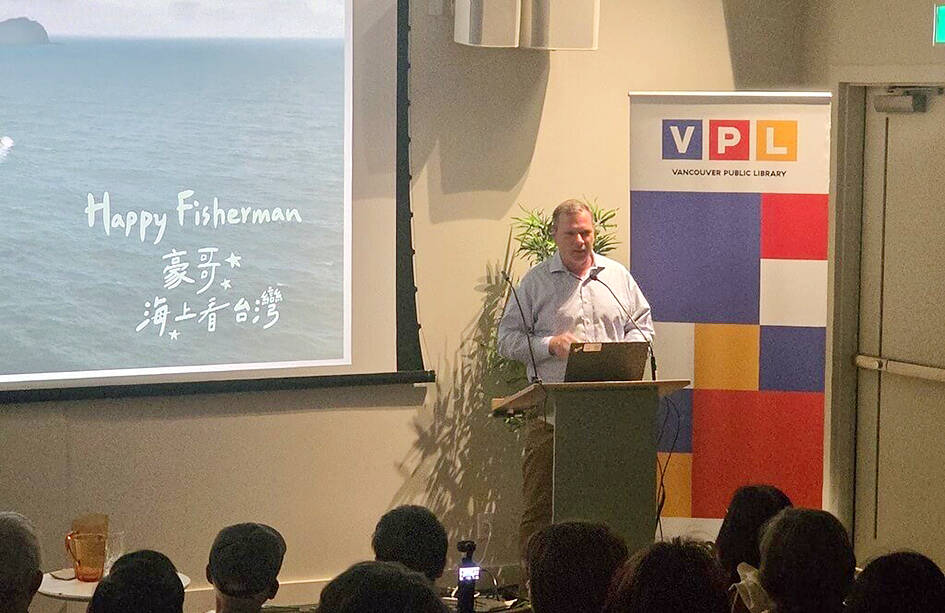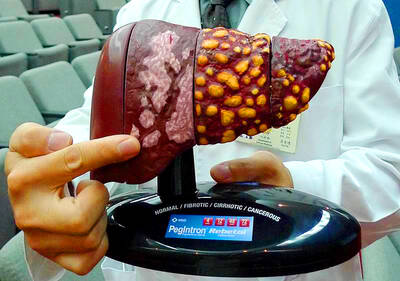Leo Seewald, a Canadian- born lawyer who became a licensed fisherman in Taiwan, shared his unusual life story at a public lecture held Friday at the Vancouver Public Library.
"I speak Mandarin and Cantonese very well," he told CNA. "I also speak German and French, but my English is the worst."
Born and raised in Vancouver, Seewald would often go out to eat in the city’s Chinatown with his family, and at age 10, he told his mother he wanted to learn Chinese.

Photo: CNA
He first studied Cantonese since that was the dialect of Chinese predominant in Vancouver at the time. He later learned Mandarin after moving to Beijing.
In Canada, Seewald earned a business degree from Simon Fraser University, followed by a law degree from the University of Alberta.
He later worked at a law firm in Hong Kong, a move helped by his earlier study of Chinese.
In 2006, Seewald joined Manulife Financial, a major Canadian corporation. His boss gave him the choice to go to either Taiwan or Indonesia.
"A lot of people told me Taiwan is great and that I wouldn’t regret going," he said.
He went on to serve as vice president of Manulife Insurance in Taiwan and chairman of its asset management arm.
It was there that Seewald’s maritime explorations began.
He initially toured Taiwan’s waters by yacht, but was disappointed to learn that many of the island’s harbors were restricted to fishing vessels only.
After obtaining a national ID card five years ago, he was finally eligible to take the required exams to become a certified fisherman in Taiwan.
"To this day," he said, "I believe I’m the only white fisherman in Taiwan."
Seewald said he has now visited more than 170 out of 230 fishing harbors in Taiwan.
Now serving as chairman of New Green Power (NGP), a Taipei-based renewables company, Seewald also hosts the TaiwanPlus television program "Happy Fisherman," where he sails with local fishermen.
The lecture at the public library was the first warm-up event for this year’s TaiwanFest, which promotes Taiwan and Taiwanese culture in Canada.

The Taipei Summer Festival is to begin tomorrow at Dadaocheng Wharf (大稻埕), featuring four themed firework shows and five live music performances throughout the month, the Taipei Department of Information and Tourism said today. The festival in the city’s Datong District (大同) is to run until Aug. 30, holding firework displays on Wednesdays and the final Saturday of the event. The first show is scheduled for tomorrow, followed by Aug. 13, 20 and 30. To celebrate the 30th anniversary of Disney Pixar's movie Toy Story, the festival has partnered with Walt Disney Co (Taiwan) to host a special themed area on

Aftershocks from a magnitude 6.2 earthquake that struck off Yilan County at 3:45pm yesterday could reach a magnitude of 5 to 5.5, the Central Weather Administration (CWA) said. Seismological Center technical officer Chiu Chun-ta (邱俊達) told a news conference that the epicenter of the temblor was more than 100km from Taiwan. Although predicted to measure between magnitude 5 and 5.5, the aftershocks would reach an intensity of 1 on Taiwan’s 7-tier scale, which gauges the actual effect of an earthquake, he said. The earthquake lasted longer in Taipei because the city is in a basin, he said. The quake’s epicenter was about 128.9km east-southeast

BE CAREFUL: The virus rarely causes severe illness or death, but newborns, older people and those with medical conditions are at risk of more severe illness As more than 7,000 cases of chikungunya fever have been reported in China’s Guangdong Province this year, including 2,892 new cases last week, the Centers for Disease Control (CDC) yesterday said it is monitoring the situation and considering raising the travel notice level, which might be announced today. The CDC issued a level 1 travel notice, or “watch,” for Guangdong Province on July 22, citing an outbreak in Foshan, a manufacturing hub in the south of the province, that was reported early last month. Between July 27 and Saturday, the province reported 2,892 new cases of chikungunya, reaching a total of 7,716

STAY VIGILANT: People should reduce the risk of chronic liver inflammation by avoiding excessive alcohol consumption, smoking and eating pickled foods, the physician said A doctor last week urged people to look for five key warning signs of acute liver failure after popular producer-turned-entertainer Shen Yu-lin (沈玉琳) was reportedly admitted to an intensive care unit for fulminant hepatitis. Fulminant hepatitis is the rapid and massive death of liver cells, impairing the organ’s detoxification, metabolic, protein synthesis and bile production functions, which if left untreated has a mortality rate as high as 80 percent, according to the Web site of Advancing Clinical Treatment of Liver Disease, an international organization focused on liver disease prevention and treatment. People with hepatitis B or C are at higher risk of